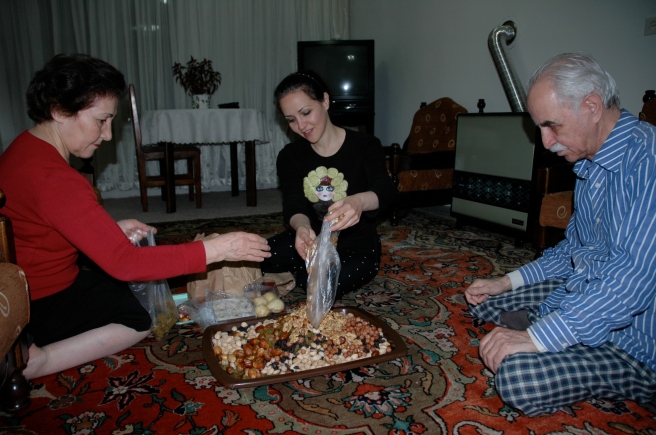Last week, I started the spring cleaning and also sprouted some lentils for the haft siin table, In this post I’ll speak about Chaharshanbeh soori – چهارشنبه سوری – red Wednesday in Farsi and Akhir Chaharshanba – اخیر چهارشنبه – last Wednesday in Azeri. Check out my instagram for photos. For millennia, the peoples of the Greater Iran region have built fires and jumped over them in a symbolic act of cleansing, change of fortune, and seeing the old year out, and new one in. I haven’t studied the origins of Chaharshanbeh soori to know for sure if it was Zoroastrian or a post Islamic Iran way of disrespecting fire (by jumping over it) and the superstition of Wednesday being lucky or unlucky. All I know is we all seem to enjoy gathering around a fire with loved ones and feel comforted in its glow and warmed by its energy.
In days gone by chaharshanbeh soori celebrations would have been more elaborate. It is fantastic to think that a whole nation still gathers in gardens, yards and streets, every year, to continue the tradition. In different areas of Iran, different rhymes are uttered mid-leap. In farsi-speaking areas people ask for the fires rosy glow in place of their winter pallor:
Sorkhi to az man, zardi man as to
سرخی تو از من و زردی من از تو
In Azerbaijan we ask for good fortune:
Atil batil charahanbe bakhtim achil
آتیل باتیل چهارشنبه بختیم آچیل
Unmarried girls used to go around banging spoons on pots and asking for a change to their fortune (ideally, a husband). Nowadays, it is sweet-toothed children. You might be thinking of the similarities with Halloween (children asking for treats), Wassailing (banging pots to ward off evil spirits) and Chinese New Year (significance of red, firecrackers): well, you are right. The observance of equinoxes, solstices and other goings on in nature seem to be universal to humankind. Arbitrary lines on maps don’t alter the fact that we are all the same. In human history, invariably pagan festivals have been altered to religious traditions. In some areas of China, brides walk over fire to burn away bad luck and in Northern Europe, the feast of St John (mid summer solstice) was marked by building fires to ward off evil: people partied and, yes, jumped over them!
No matter the weather or where I am in the world, on the eve of the last Wednesday before the vernal equinox, and Nowruz I leap into the new year. In the photos below: jumping In Iran, indoors in the UK as it was raining, on the allotment and a few years ago on holiday in France.
All this fire making and jumping makes us a bit peckish so to snack we mix a bowl of trail mix know as Ajil. The ajil chaharshanbeh soori in farsi and akhir chaharshanba yemish in azeri is usually made with unsalted dried fruit and nuts. The mix will vary in different homes and regions of Iran depending on what is grown locally. We are lucky as we have relations with vineyards and orchards so mum mixes various homegrown sultanas, raisins, currants, figs, apricots, with walnuts, pistachios, almonds, hazelnuts, etc. We make stuffed dried pears and peaches known as mianpour; also, there is soojugh and baslugh nuts cooked in grape syrup, threaded onto string. They are like edible large bead necklaces.
In our family, there is also the tradition of throwing a few nuts into the corners of the room as a token of future prosperity and providing an unexpected treat!

To finish this blog, I leave you with the first poem I learnt in farsi by Saʿdī, a 13C poet. It happens to be the over door in the Hall of Nations at the UN.
بنی آدم اعضای یک پیکرند که در آفرينش ز یک گوهرند چو عضوى به درد آورد روزگار دگر عضو ها را نماند قرار تو کز محنت دیگران بی غمی نشاید که نامت نهند آدمیI prefer this less know translation by Hossein Vahid Dastjerdi:
Adam’s sons are body limbs, to say For they’re created of the same clay Should one organ be troubled by pain Others would suffer severe strain Thou, careless of people’s suffering Deserve not the name, human beingAbū-Muhammad Muslih al-Dīn bin Abdallāh Shīrāzī
ابومحمد مصلح الدین بن عبدالله شیرازی
AKA Saʿdī سعدی
What are your family traditions and celebrations? Please let me know via the comment box below.
Merci and a rosy glow to you all.










